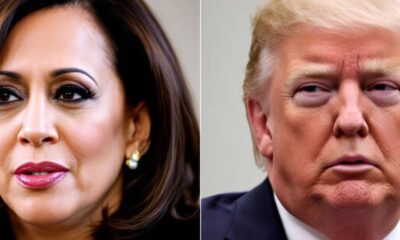Civil Rights
Central Park Five Sue Trump For Defamation Over Debate Remarks

The Central Park Five, a group of five Black and Hispanic teenagers wrongfully convicted in the 1989 rape case of a white jogger, have filed a defamation lawsuit against Donald Trump. This legal action stems from remarks made by Trump during a recent presidential debate, where he falsely claimed that the group had killed someone and pleaded guilty to the crime.
Key Takeaways
- The lawsuit was filed in federal court in Philadelphia by Yusef Salaam, Raymond Santana, Kevin Richardson, Antron Brown, and Korey Wise.
- Trump’s statements during the debate were labeled as "demonstrably false" by the plaintiffs.
- The plaintiffs are seeking unspecified monetary damages for reputational and emotional harm, as well as punitive damages.
- Trump’s campaign dismissed the lawsuit as a frivolous attempt at election interference.
Background of the Case
The Central Park Five were wrongfully convicted for the 1989 rape of a jogger in New York’s Central Park. They spent between five and 13 years in prison before being exonerated in 2002, thanks to new DNA evidence and a confession from another individual. The case has remained a significant point of discussion regarding racial injustice and wrongful convictions in the United States.
Trump’s Controversial Remarks
During the presidential debate on September 10, Trump made statements that the plaintiffs argue are not only false but also damaging. He claimed that the Central Park Five had killed someone and had admitted guilt, which the plaintiffs vehemently deny. This assertion has reignited discussions about Trump’s long-standing comments on the case, including a full-page ad he took out in New York newspapers in 1989 calling for the reinstatement of the death penalty.
Legal Proceedings
The lawsuit was filed by the five men, who are now prominent figures in their communities, with Yusef Salaam serving on the New York City Council. Their attorney, Shanin Specter, emphasized that the lawsuit is not politically motivated, stating, "We are seeking redress in a court of law."
The plaintiffs are pursuing unspecified monetary damages for the emotional distress and reputational harm caused by Trump’s statements. They argue that the remarks have cast them in a harmful light, further complicating their efforts to move on from their past.
Reactions and Implications
Trump’s campaign responded to the lawsuit by labeling it as a frivolous action by "desperate left-wing activists." This response is consistent with Trump’s previous dismissals of legal challenges against him, including a recent appeal regarding a $5 million verdict related to sexual assault and defamation claims made by writer E. Jean Carroll.
The Central Park Five’s lawsuit against Trump highlights ongoing issues of racial injustice and the impact of public figures’ statements on the lives of individuals wrongfully accused. As the case unfolds, it may serve as a pivotal moment in the broader conversation about accountability and the consequences of defamation in the political arena.
Conclusion
The Central Park Five’s legal action against Donald Trump underscores the lasting effects of wrongful convictions and the importance of truth in public discourse. As they seek justice in the courts, their story continues to resonate, reminding society of the need for vigilance against misinformation and the pursuit of justice for all.
Sources
-

 Business6 days ago
Business6 days agoS&P 500 Soars in Best May in Decades Amid Tariff Relief and Nvidia’s Surge
-

 Immigration6 days ago
Immigration6 days agoTrump’s Immigration Crackdown: Legal Battles and Policy Shifts
-

 Business6 days ago
Business6 days agoUS Stock Market Soars in May Amidst Tariff Tensions and Inflation Worries
-

 Government6 days ago
Government6 days agoTrump Administration’s Government Reshaping Efforts Face Criticism and Legal Battles
-

 Business6 days ago
Business6 days agoTrump’s Tariffs: A Global Economic Reckoning
-

 Foreign Policy4 days ago
Foreign Policy4 days agoInside Schedule F: Will Trump’s Federal Workforce Shake-Up Undermine Democracy?
-

 Press Release3 days ago
Press Release3 days agoIn2space Launches Campaign to Make Space Travel Accessible for All































